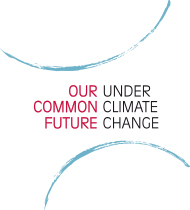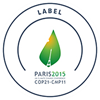Malaria is a complex parasitic disease confined mostly to tropical areas and transmitted by mosquitoes of the genus�Anopheles.�According to the World Health Organization' records for 2012, there were 207 million malaria cases worldwide with 627,000 deaths.�Most of these deaths (90%) occurred in sub-Saharan Africa of which 77%�were�in children younger than 5 years of age, and over 10% of South Africa�s population is living in malaria-epidemic provinces (Limpopo, Mpumalanga and KwaZulu-Natal).
�
However, malaria is
very sensitive to climatic variability. Since mosquitoes thrive better
in a warm, moist environment, there is a big concern that the projected
global warming may make malaria parasites spread over more provinces in
South Africa, thereby exposing more populations to malaria epidemics.
Insofar as concerns monitoring epidemics, merging health data with
environmental and climatic data gathered by observation satellites (data
on water, air, vegetation and soil) can be used to identify the
conditions likely to cause diseases and to gain a deeper understanding
of the mechanisms involved in the spread of disease.
A good climate-malaria modelling system is thus a central tool for providing early warning on malaria outbreaks and for studying potential impacts of future climate change on malaria - giving decision makers the necessary time to deploy intervention methods to help prevent large scale spread of malaria.
�
Within the framework of cooperation projects developed on the basis of the working groups and consortiums in which it is involved, CNES gained expertise in tele-epidemiology research projects in South America, as well as in the French Overseas Departments and Territories and Western Africa (Senegal, and Burkina-Faso), setting up epidemic monitoring networks. As the tele-epidemiology concept could also be a lever to address the malaria epidemics in Southern Africa and Indian Ocean region, a bilateral discussion was engaged between the Centre for Sustainable Malaria Control of the University of Pretoria and the CNES, to explore the potential of a joint research project using remote senisng to help prevent malaria spread.
�
It is proposed that research activities between the UP CSMC and French partners should firstly focus on the elaboration of malaria predictive risk maps to investigate impacts of climate variability and changes on the occurrence and intensity of malaria epidemics. The work will bring together experts in science and health to investigate the link between climate and vector-borne diseases, gathering scientists from French research institutions (CNES, UMR Espace-D�v-IRD, CIRAD, Laboratoire d�A�rologie of the Midi-Pyr�n�es Observatory, , etc.), South African partners (SANSA, Centre for Sustainable Malaria Control of the University of Pretoria, South African Department of Health and Malaria Research Unit (MRU), Medical Research Council (MRC), etc.) and other partners from the region (University of Zimbabwe, Pasteur Institute of Madagascar, etc.).
�
The objective of the conference is to draw together the key players of the project in order to identify partners particularly suitable for the cooperation, define the boundary conditions of the research programme and explore funding opportunities.
�
Agenda of the Side Event- Day 1 (50 attendees)
Opening by the French Ambassador and an executive from University of Pretoria; conferences to present the actors of the projects; general introductions to tele-epidemiology and challenges in malaria research in Africa; cocktail at the French Ambassador residence
- Day 2 (30
attendees):
Working sessions and round tables to discuss the scientific and technical aspects of the programme; finalisation of the concept note.
- �




